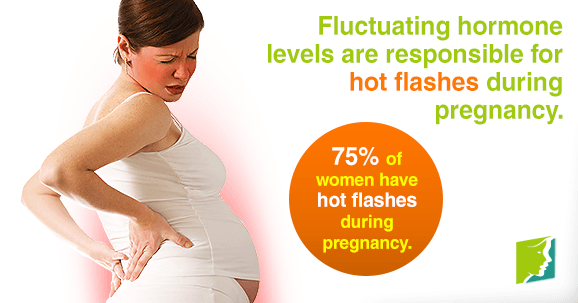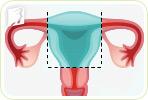Although hot flashes are typically associated with menopause, hot flashes during pregnancy and post-partum are also common. Research has shown that around 35% of women experience hot flashes while pregnant, and 29% report hot flashes after giving birth. Similarly to menopause, fluctuating hormone levels are probably responsible for hot flashes during pregnancy. However, only one academic study has been done on hot flashes during pregnancy, so this is a topic about which not much is known and should continue to be researched.
What Are the Symptoms of Hot Flashes?
Symptoms of hot flashes include:
- Sudden sensations of intense heat in the upper body
- Increased heart rate
- Flushing of the chest, neck, and face
- Excessive perspiration
Women are most likely to experience hot flashes during the third trimester of pregnancy, but they can experience hot flashes at any time while pregnant. After giving birth, women are most likely to experience hot flashes in the few weeks following birth.
What Triggers Hot Flashes?
The exact causes for hot flashes are still undetermined, but it's probable that hot flashes during pregnancy are linked to reactions between hormones and the brain. Research has shown that some factors increase the likelihood that a woman will experience hot flashes during pregnancy.
Women who are younger when they get pregnant, women who have a higher BMI before getting pregnant, and women who do not have a college education are more likely to experience hot flashes. These are probably correlation and not causation, so it is important that research continues to have a better understanding of pregnancy, women, and female hormones.
How to Deal with Hot Flashes
Even in menopausal women, where hot flashes are more common and there is no fetus to worry about, it can be difficult to find a treatment for hot flashes that work. In order to lessen the impact of hot flashes, many women lifestyle changes helpful. Carrying around a thermos full of ice water can help you cool yourself down when a hot flash hits. If hot flashes happen at night, try sleeping in pajamas and using sheets that are light colors, fit loosely, and are made of natural materials.
Relaxation techniques such as yoga, deep breathing, and meditation may be beneficial in reducing hot flashes. If your hot flashes continue to bother you, it is important to talk about them with your doctor, who may be able to provide further advice and treatments that fit your situation.
Sources
- National Childbirth Trust. (n.d.). Pregnancy Hormones. Retrieved September 24, 2015, from https://www.nct.org.uk/pregnancy/hormones-pregnancy.
- Thurston, R. C., Luther, J. F., Wisniewski, S. R., Eng, H., & Wisner, K. L. (2013). Prospective Evaluation of Hot Flashes during Pregnancy and Postpartum. Fertility and Sterility, 100(6), 1667-1672. Retrieved from http://doi.org/10.1016/j.fertnstert.2013.08.020.




